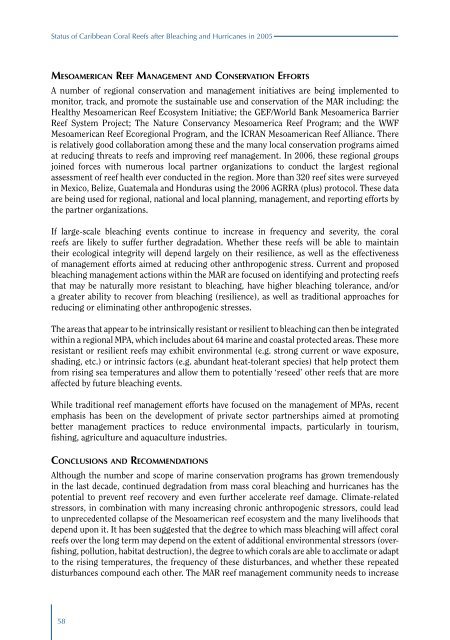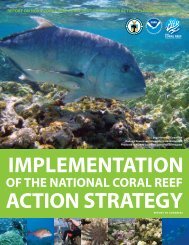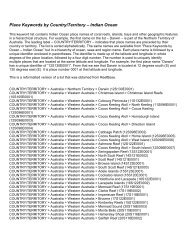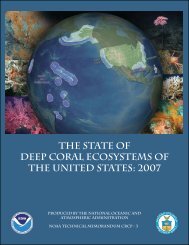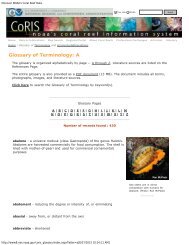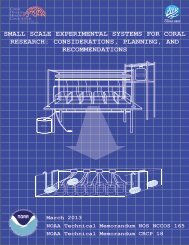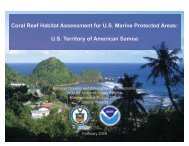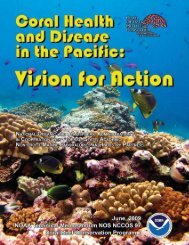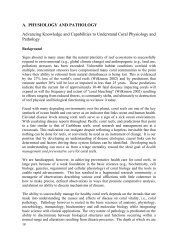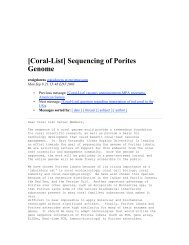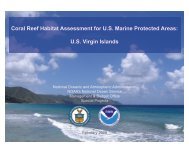Status of Caribbean coral reefs after bleaching and hurricanes in 2005
Status of Caribbean coral reefs after bleaching and hurricanes in 2005
Status of Caribbean coral reefs after bleaching and hurricanes in 2005
Create successful ePaper yourself
Turn your PDF publications into a flip-book with our unique Google optimized e-Paper software.
<strong>Status</strong> <strong>of</strong> <strong>Caribbean</strong> Coral Reefs <strong>after</strong> Bleach<strong>in</strong>g <strong>and</strong> Hurricanes <strong>in</strong> <strong>2005</strong>Mesoamerican Reef Ma n ag e m e n t a n d Co n s e r vat i o n EffortsA number <strong>of</strong> regional conservation <strong>and</strong> management <strong>in</strong>itiatives are be<strong>in</strong>g implemented tomonitor, track, <strong>and</strong> promote the susta<strong>in</strong>able use <strong>and</strong> conservation <strong>of</strong> the MAR <strong>in</strong>clud<strong>in</strong>g: theHealthy Mesoamerican Reef Ecosystem Initiative; the GEF/World Bank Mesoamerica BarrierReef System Project; The Nature Conservancy Mesoamerica Reef Program; <strong>and</strong> the WWFMesoamerican Reef Ecoregional Program, <strong>and</strong> the ICRAN Mesoamerican Reef Alliance. Thereis relatively good collaboration among these <strong>and</strong> the many local conservation programs aimedat reduc<strong>in</strong>g threats to <strong>reefs</strong> <strong>and</strong> improv<strong>in</strong>g reef management. In 2006, these regional groupsjo<strong>in</strong>ed forces with numerous local partner organizations to conduct the largest regionalassessment <strong>of</strong> reef health ever conducted <strong>in</strong> the region. More than 320 reef sites were surveyed<strong>in</strong> Mexico, Belize, Guatemala <strong>and</strong> Honduras us<strong>in</strong>g the 2006 AGRRA (plus) protocol. These dataare be<strong>in</strong>g used for regional, national <strong>and</strong> local plann<strong>in</strong>g, management, <strong>and</strong> report<strong>in</strong>g efforts bythe partner organizations.If large-scale <strong>bleach<strong>in</strong>g</strong> events cont<strong>in</strong>ue to <strong>in</strong>crease <strong>in</strong> frequency <strong>and</strong> severity, the <strong>coral</strong><strong>reefs</strong> are likely to suffer further degradation. Whether these <strong>reefs</strong> will be able to ma<strong>in</strong>ta<strong>in</strong>their ecological <strong>in</strong>tegrity will depend largely on their resilience, as well as the effectiveness<strong>of</strong> management efforts aimed at reduc<strong>in</strong>g other anthropogenic stress. Current <strong>and</strong> proposed<strong>bleach<strong>in</strong>g</strong> management actions with<strong>in</strong> the MAR are focused on identify<strong>in</strong>g <strong>and</strong> protect<strong>in</strong>g <strong>reefs</strong>that may be naturally more resistant to <strong>bleach<strong>in</strong>g</strong>, have higher <strong>bleach<strong>in</strong>g</strong> tolerance, <strong>and</strong>/ora greater ability to recover from <strong>bleach<strong>in</strong>g</strong> (resilience), as well as traditional approaches forreduc<strong>in</strong>g or elim<strong>in</strong>at<strong>in</strong>g other anthropogenic stresses.The areas that appear to be <strong>in</strong>tr<strong>in</strong>sically resistant or resilient to <strong>bleach<strong>in</strong>g</strong> can then be <strong>in</strong>tegratedwith<strong>in</strong> a regional MPA, which <strong>in</strong>cludes about 64 mar<strong>in</strong>e <strong>and</strong> coastal protected areas. These moreresistant or resilient <strong>reefs</strong> may exhibit environmental (e.g. strong current or wave exposure,shad<strong>in</strong>g, etc.) or <strong>in</strong>tr<strong>in</strong>sic factors (e.g. abundant heat-tolerant species) that help protect themfrom ris<strong>in</strong>g sea temperatures <strong>and</strong> allow them to potentially ‘reseed’ other <strong>reefs</strong> that are moreaffected by future <strong>bleach<strong>in</strong>g</strong> events.While traditional reef management efforts have focused on the management <strong>of</strong> MPAs, recentemphasis has been on the development <strong>of</strong> private sector partnerships aimed at promot<strong>in</strong>gbetter management practices to reduce environmental impacts, particularly <strong>in</strong> tourism,fish<strong>in</strong>g, agriculture <strong>and</strong> aquaculture <strong>in</strong>dustries.Co n c l u s i o n s a n d Re c o m m e n d at i o n sAlthough the number <strong>and</strong> scope <strong>of</strong> mar<strong>in</strong>e conservation programs has grown tremendously<strong>in</strong> the last decade, cont<strong>in</strong>ued degradation from mass <strong>coral</strong> <strong>bleach<strong>in</strong>g</strong> <strong>and</strong> <strong>hurricanes</strong> has thepotential to prevent reef recovery <strong>and</strong> even further accelerate reef damage. Climate-relatedstressors, <strong>in</strong> comb<strong>in</strong>ation with many <strong>in</strong>creas<strong>in</strong>g chronic anthropogenic stressors, could leadto unprecedented collapse <strong>of</strong> the Mesoamerican reef ecosystem <strong>and</strong> the many livelihoods thatdepend upon it. It has been suggested that the degree to which mass <strong>bleach<strong>in</strong>g</strong> will affect <strong>coral</strong><strong>reefs</strong> over the long term may depend on the extent <strong>of</strong> additional environmental stressors (overfish<strong>in</strong>g,pollution, habitat destruction), the degree to which <strong>coral</strong>s are able to acclimate or adaptto the ris<strong>in</strong>g temperatures, the frequency <strong>of</strong> these disturbances, <strong>and</strong> whether these repeateddisturbances compound each other. The MAR reef management community needs to <strong>in</strong>crease58


